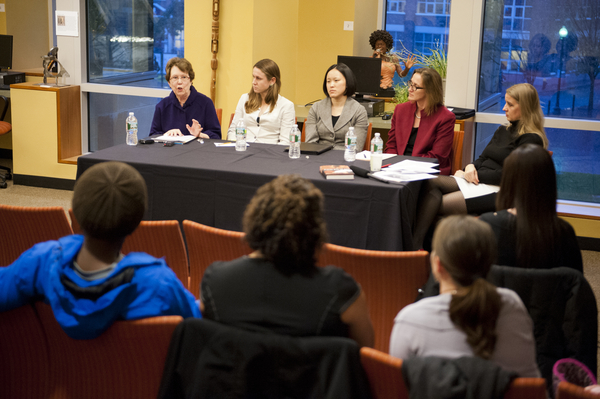40 years after Title IX

The London 2012 Olympics marked the first time in history that every participating country sent a female athlete to the games. In honor of this monumental feat, the games were dubbed “The Year of the Woman.”
“That was a big step not just in the world of sports, but for all women around the world,” said Erika Koss, assistant dean for research and program development in the College of Social Sciences and Humanities and the associate director of Northeastern’s Humanities Center.
Last week Koss moderated a panel discussion that used the Olympic accomplishments of women and the 40th anniversary of Title IX as a launching pad to discuss the continuing impact of the 1972 landmark legislation. The amendment banned discrimination on the basis of sex under any educational program or activity receiving federal funding.
The event was held in the John D. O’Bryant African-American Institute Library and co-sponsored by the Humanities Center and the Athletics Department. It featured four female panelists, all of whom said Title IX had directly affected their lives to varying degrees: Amanda Braun, Northeastern University’s executive senior associate director of athletics; Amy Huchthausen, commissioner of the America East Conference; Heather O’Reilly, a member of the 2012 U.S. National Women’s Soccer team and three-time gold medalist; and Eileen McDonagh, a Northeastern political science professor and co-author of “Playing with the Boys: Why Separate is Not Equal in Sports.”
In her remarks at the start of the event, McDonagh noted an exception in Title IX permitting sex segregation in contact sports such a boxing, wrestling or rugby.
“Sports is the most sex-segregated secular institution in American society,” McDonagh said. She attributes this to a socially constructed belief that women are physically inferior to men, and therefore will be physically and psychologically injured if put in direct competition with men.
“We have inferiority, injury and a form of immorality as the three reasons that underline the argument for sex segregation,” she added.
Braun, for her part, explained that the number of women participating in sports has increased, but pointed to a large gap between how many men and women are in sports leadership positions. “When women get into more decision-making roles and are starting to influence legislation,” she asserted, “then we’re at least at the table to have that conversation.”
While panelists agreed that much more progress must be made, they also said there is much to celebrate in the 40 years since the enactment of Title IX. O’Reilly noted that her skill and determination earned her a full scholarship to play soccer at the University of North Carolina at Chapel Hill, but credited Title IX for making playing possible. She stressed that women who receive similar opportunities must take advantage of them to the fullest.
“If you can prove it on the field, you’re going to open a lot of eyes and open a lot of opportunities,” O’Reilly said.





